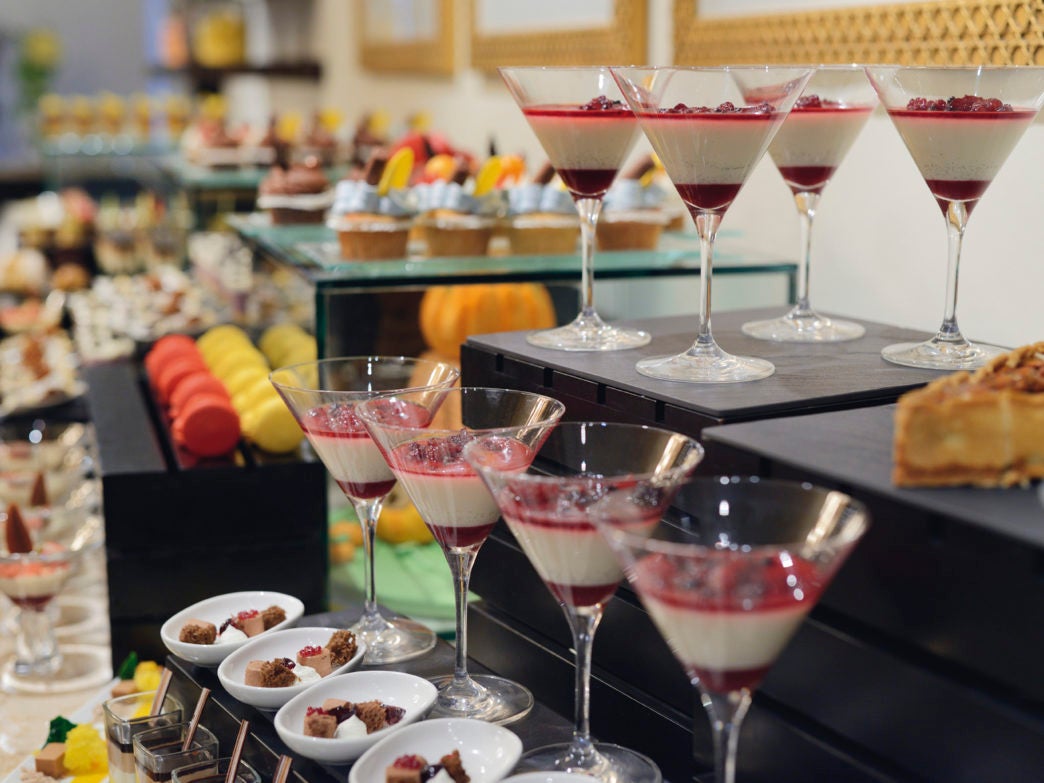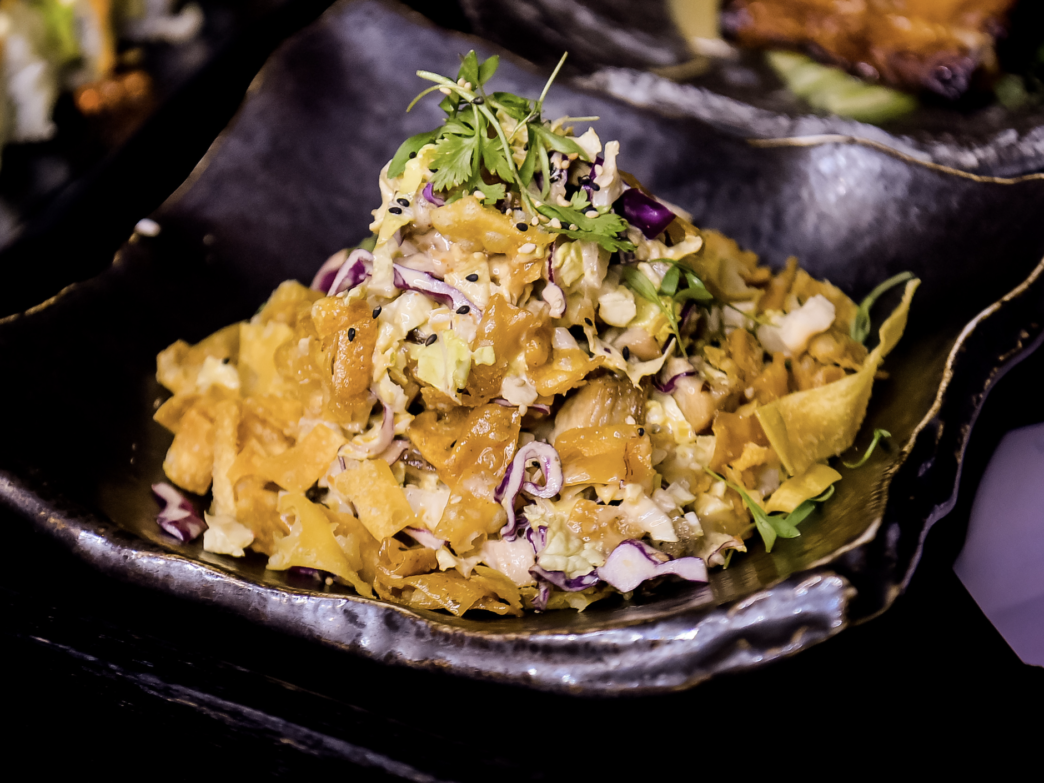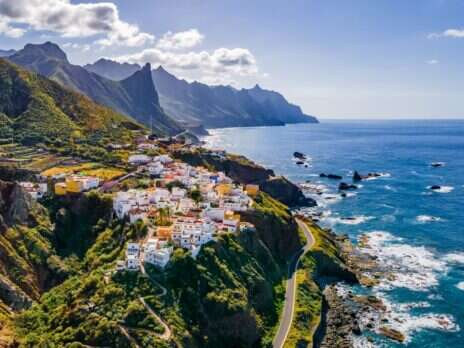
As World Environment Day approaches, we take a look at the farm-to-table restaurants excelling in sustainability and the pioneering chefs behind them.
Blue Hill at Stone Barns
USA
 The Michelin-starred restaurant Blue Hill at Stone Barns is considered one of upstate New York’s most innovative restaurants, often named among the world’s best fine dining venues. This culinary status is in part owing to the creativity and culinary finesse of chef Dan Barber, but it’s also a result of Barber’s mission to promote farm-to-table dining, provenance and sustainability. This sustainable approach is based on the idea that people increasingly want to know where their food came from, how it was cultivated and by who. By sharing the stories behind the ingredients’ origin, Barber and his team make a meal at the restaurant a more memorable experience, with dishes coming in tasting menus encompassing up to 30 or 40 dishes ranging from single bites to more composed plates. As the chef’s discovery of this region’s produce continues, the menus here evolve and Barber comes closer to achieving his goal of establishing a distinct Hudson Valley cuisine.
The Michelin-starred restaurant Blue Hill at Stone Barns is considered one of upstate New York’s most innovative restaurants, often named among the world’s best fine dining venues. This culinary status is in part owing to the creativity and culinary finesse of chef Dan Barber, but it’s also a result of Barber’s mission to promote farm-to-table dining, provenance and sustainability. This sustainable approach is based on the idea that people increasingly want to know where their food came from, how it was cultivated and by who. By sharing the stories behind the ingredients’ origin, Barber and his team make a meal at the restaurant a more memorable experience, with dishes coming in tasting menus encompassing up to 30 or 40 dishes ranging from single bites to more composed plates. As the chef’s discovery of this region’s produce continues, the menus here evolve and Barber comes closer to achieving his goal of establishing a distinct Hudson Valley cuisine.
Le Cinq
France
 Earlier this year, Four Seasons Hotel George V, Paris announced the beginning of a new initiative to give guests insight into the sustainable vision of its three different Michelin-starred restaurants. Among these three restaurants is three-Michelin-starred Le Cinq with chef Christian Le Squer. Here the chef fuses the fundamentals of traditional French cuisine with culinary modernity, a passion for sourcing sustainable produce, and in particular a passion for protecting the ocean. Having grown up in a small fishing community this is a connection Le Squer has felt from a young age, so now he draws on his status in the culinary world to share the message and give diners an exceptional gastronomic experience. For the menu at Le Cinq, Le Squer sources ingredients from small-scale artisan producers and fishermen while staying in tune with the seasons – dishes include line-fished sea bass with caviar and buttermilk. Recently, the chef played a role in launching Surfrider’s Ocean Initiatives, a program committed to tackling the marine litter issue.
Earlier this year, Four Seasons Hotel George V, Paris announced the beginning of a new initiative to give guests insight into the sustainable vision of its three different Michelin-starred restaurants. Among these three restaurants is three-Michelin-starred Le Cinq with chef Christian Le Squer. Here the chef fuses the fundamentals of traditional French cuisine with culinary modernity, a passion for sourcing sustainable produce, and in particular a passion for protecting the ocean. Having grown up in a small fishing community this is a connection Le Squer has felt from a young age, so now he draws on his status in the culinary world to share the message and give diners an exceptional gastronomic experience. For the menu at Le Cinq, Le Squer sources ingredients from small-scale artisan producers and fishermen while staying in tune with the seasons – dishes include line-fished sea bass with caviar and buttermilk. Recently, the chef played a role in launching Surfrider’s Ocean Initiatives, a program committed to tackling the marine litter issue.
Sat Bains
UK
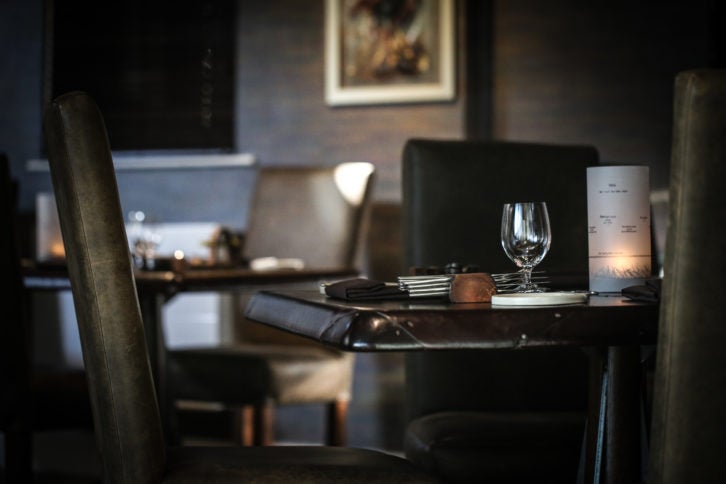 Tempting gastronomes to its riverside location in Nottingham, two-Michelin-starred dining spot Sat Bains has become a global culinary draw, consistently being voted one of the Elite Collection Top 100 Restaurants. Here, the chef (Sat Bains) of this eponymous restaurant revels in the juxtaposition his restaurant presents between its urban location and fine dining dishes using produce grown and sourced from the immediate surroundings, succinctly highlighting the scope for growing fresh produce in a city. The restaurant’s urban garden produces around 40 per cent of the kitchen’s vegetables and herbs, and the rest is sourced from artisan producers in the UK. To minimize environmental impact, the restaurant installed LED lighting, energy efficient induction hobs and integrated a composting system that processes the majority of food waste into compost for the two on-site Victorian greenhouses where some of the menus’ ingredients come from. While dining on dishes from the kitchen now helmed by the chef John Freeman, you know the food you’re eating is connected to the land around you.
Tempting gastronomes to its riverside location in Nottingham, two-Michelin-starred dining spot Sat Bains has become a global culinary draw, consistently being voted one of the Elite Collection Top 100 Restaurants. Here, the chef (Sat Bains) of this eponymous restaurant revels in the juxtaposition his restaurant presents between its urban location and fine dining dishes using produce grown and sourced from the immediate surroundings, succinctly highlighting the scope for growing fresh produce in a city. The restaurant’s urban garden produces around 40 per cent of the kitchen’s vegetables and herbs, and the rest is sourced from artisan producers in the UK. To minimize environmental impact, the restaurant installed LED lighting, energy efficient induction hobs and integrated a composting system that processes the majority of food waste into compost for the two on-site Victorian greenhouses where some of the menus’ ingredients come from. While dining on dishes from the kitchen now helmed by the chef John Freeman, you know the food you’re eating is connected to the land around you.
Mil
Peru
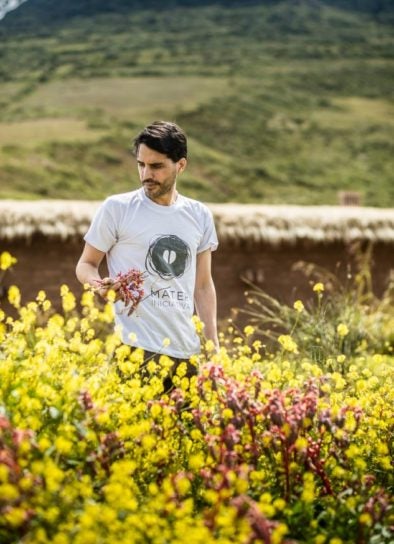 Globally renowned Peruvian chef Virgilio Martinez launched his newest restaurant Mil earlier this year. The new dining spot is situated at 11,700 ft above sea level in a rural area close to the archaeological site Moray, to the northwest of Cusco. The restaurant is a continuation of his ongoing endeavor to seek out new ingredients from Peru’s diverse landscape of desert, mountains, rain forest and sea, spanning an astonishing range of altitudes. The epitome of sustainability, this restaurant is all about farm-to-table dining and foraging, and acts as a base for the Mater Iniciativa research project, which is dedicated to uncovering Peru’s unknown ingredients. At Mil these ingredients are translated into accomplished eight-course tasting menus, with each course representing a different elevation and ecosystem. Dishes on the current menu include Extreme Altitude, which combines alpaca with black quinoa, lake blue-green algae and tree tomato, and Frozen Cordillera, which brings together wild muña (a mint-like herb), cow’s milk, mint and tuber ashes. Adding to its eco credentials, the building was designed to respect and blend into the natural surroundings, water is recycled and the restaurant works with farmers in the local community.
Globally renowned Peruvian chef Virgilio Martinez launched his newest restaurant Mil earlier this year. The new dining spot is situated at 11,700 ft above sea level in a rural area close to the archaeological site Moray, to the northwest of Cusco. The restaurant is a continuation of his ongoing endeavor to seek out new ingredients from Peru’s diverse landscape of desert, mountains, rain forest and sea, spanning an astonishing range of altitudes. The epitome of sustainability, this restaurant is all about farm-to-table dining and foraging, and acts as a base for the Mater Iniciativa research project, which is dedicated to uncovering Peru’s unknown ingredients. At Mil these ingredients are translated into accomplished eight-course tasting menus, with each course representing a different elevation and ecosystem. Dishes on the current menu include Extreme Altitude, which combines alpaca with black quinoa, lake blue-green algae and tree tomato, and Frozen Cordillera, which brings together wild muña (a mint-like herb), cow’s milk, mint and tuber ashes. Adding to its eco credentials, the building was designed to respect and blend into the natural surroundings, water is recycled and the restaurant works with farmers in the local community.
Miyamasou
Japan
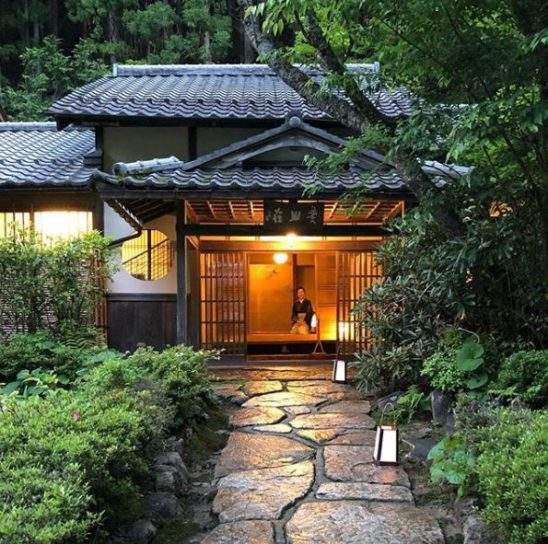 Positioned in the mountains outside Kyoto, the internationally renowned restaurant Miyamasou is found by following a mountain trail between Japanese cedars and temples and along a steam running off the Kamikatsura River, and is a restaurant that’s naturally drawn towards sustainability and provenance, as well as Japanese culinary tradition. At Miyamasou, chef Hisato Nakahigashi creates menus based on ingredients that have been foraged, grown in the restaurant’s garden and sourced from local suppliers of wild fish and game, evolving from Japan’s traditional tsumigusa (freshly picked) cuisine to encompass a wider variety of ingredients from the surroundings such as fish from the stream. Even the building, which was designed by Sotoji Nakamura and was originally the Bujouji Temple’s lodging, aims to fuse nature with Japanese tradition.
Positioned in the mountains outside Kyoto, the internationally renowned restaurant Miyamasou is found by following a mountain trail between Japanese cedars and temples and along a steam running off the Kamikatsura River, and is a restaurant that’s naturally drawn towards sustainability and provenance, as well as Japanese culinary tradition. At Miyamasou, chef Hisato Nakahigashi creates menus based on ingredients that have been foraged, grown in the restaurant’s garden and sourced from local suppliers of wild fish and game, evolving from Japan’s traditional tsumigusa (freshly picked) cuisine to encompass a wider variety of ingredients from the surroundings such as fish from the stream. Even the building, which was designed by Sotoji Nakamura and was originally the Bujouji Temple’s lodging, aims to fuse nature with Japanese tradition.
Image © tokyomanhattan
Brae
Australia
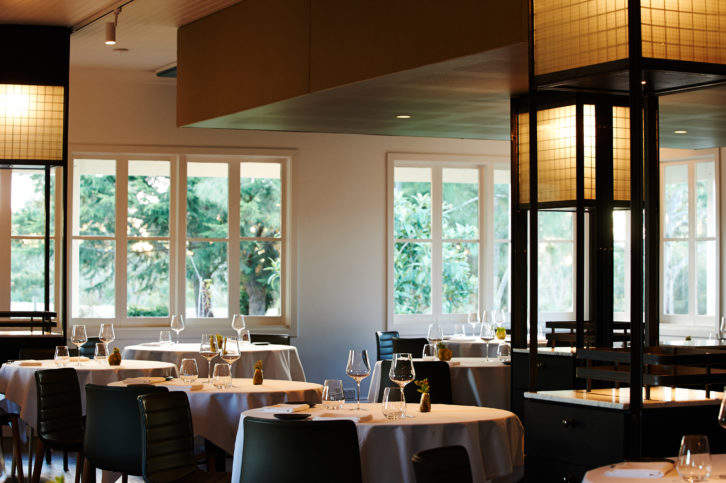 The restaurant in the town of Birregurra outside Melbourne is the work of accomplished chef Dan Hunter who was previously head chef of Mugaritz in Spain during his years spent working and traveling around the world. This international culinary influence can be seen in Hunter’s cooking, but the more dominant characteristic of the food here is his dedication to locally sourced, seasonal produce and his respect for nature. The restaurant sits within a 30-acre organic farm that uses regenerative farming techniques to restore the land. Here you’ll find an olive tree grove, from which the restaurant produces organic extra virgin olive oil, land for vegetables, fruit trees and bushes of berries, and space for free range chickens, which supply the kitchen with eggs, as well as beehives. The menus are created according to the ingredients available in the garden and by what’s brought in by local sustainable farmers. In this way, Hunter manages to craft contemporary dishes that are a reflection of the location. The accompanying wines come from artisan wine-growers who too respect the land they’re cultivating their produce on.
The restaurant in the town of Birregurra outside Melbourne is the work of accomplished chef Dan Hunter who was previously head chef of Mugaritz in Spain during his years spent working and traveling around the world. This international culinary influence can be seen in Hunter’s cooking, but the more dominant characteristic of the food here is his dedication to locally sourced, seasonal produce and his respect for nature. The restaurant sits within a 30-acre organic farm that uses regenerative farming techniques to restore the land. Here you’ll find an olive tree grove, from which the restaurant produces organic extra virgin olive oil, land for vegetables, fruit trees and bushes of berries, and space for free range chickens, which supply the kitchen with eggs, as well as beehives. The menus are created according to the ingredients available in the garden and by what’s brought in by local sustainable farmers. In this way, Hunter manages to craft contemporary dishes that are a reflection of the location. The accompanying wines come from artisan wine-growers who too respect the land they’re cultivating their produce on.
The Restaurant at Meadowood
USA
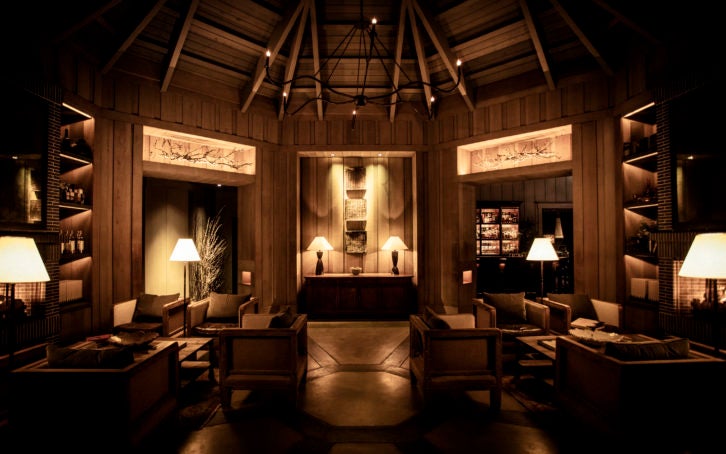 One of the youngest chefs to have earned a restaurant three Michelin stars, Christopher Kostow is the creative force behind the Restaurant at Meadowood’s gastronomy and the source of the restaurant’s ethos in sustainability and having a positive impact on the Napa Valley. With menus incorporating produce from the surrounding land and restaurant’s own organic garden, the food here is a celebration of the Napa terroir in which ingredients are showcased in their best light, both seasonally and the way they’re served. In this way, the community and land in the Napa Valley are intrinsically entwined in the restaurant’s identity, with the menu defined directly by what’s been brought in by suppliers and taken out of the ground at any one time. Naturally, the wine exhibits the same connection to the local land and community as the food, with the restaurant’s team of sommeliers forging relationships with Napa’s growers and thriving on collaboration.
One of the youngest chefs to have earned a restaurant three Michelin stars, Christopher Kostow is the creative force behind the Restaurant at Meadowood’s gastronomy and the source of the restaurant’s ethos in sustainability and having a positive impact on the Napa Valley. With menus incorporating produce from the surrounding land and restaurant’s own organic garden, the food here is a celebration of the Napa terroir in which ingredients are showcased in their best light, both seasonally and the way they’re served. In this way, the community and land in the Napa Valley are intrinsically entwined in the restaurant’s identity, with the menu defined directly by what’s been brought in by suppliers and taken out of the ground at any one time. Naturally, the wine exhibits the same connection to the local land and community as the food, with the restaurant’s team of sommeliers forging relationships with Napa’s growers and thriving on collaboration.
Wolfgat
South Africa
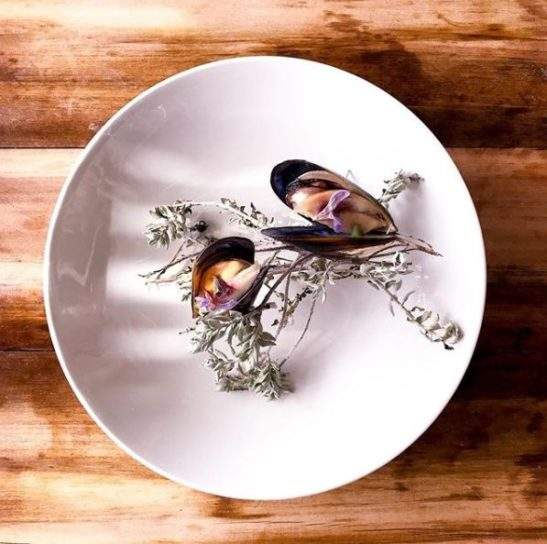 A couple of hours up the west coast from Cape Town, Paternoster fishing village isn’t always a location travelers think to make the journey to. The idyllic coastal spot is a favorite weekend escape for Capetonians though, thanks to its ocean setting where dolphins and whales can be spotted ten months of the year, wild flowers bloom in spring and the seafood is exceptional – the village is famous for its abundant crayfish. Another reason for traveling here is the 20-seat sustainable restaurant of South African chef Kobus van der Merwe, which takes its name Wolfgat from the ancient cave it’s situated right by. When the chef opened Wolfgat in Paternoster it became one of the first restaurants in the country to place the focus on foraging and sustainably harvested produce, taking ingredients from the sea, shores and fields. This approach results in seven-course South African tasting menus featuring lesser known plants and seaweed from each season along with exceptionally fresh seafood, giving you a sense of the wild coastal setting you’re in.
A couple of hours up the west coast from Cape Town, Paternoster fishing village isn’t always a location travelers think to make the journey to. The idyllic coastal spot is a favorite weekend escape for Capetonians though, thanks to its ocean setting where dolphins and whales can be spotted ten months of the year, wild flowers bloom in spring and the seafood is exceptional – the village is famous for its abundant crayfish. Another reason for traveling here is the 20-seat sustainable restaurant of South African chef Kobus van der Merwe, which takes its name Wolfgat from the ancient cave it’s situated right by. When the chef opened Wolfgat in Paternoster it became one of the first restaurants in the country to place the focus on foraging and sustainably harvested produce, taking ingredients from the sea, shores and fields. This approach results in seven-course South African tasting menus featuring lesser known plants and seaweed from each season along with exceptionally fresh seafood, giving you a sense of the wild coastal setting you’re in.
Image © thejoburgfoodie
Azurmendi
Spain
A restaurant that’s been at the top of the Elite Collection Top 100 Restaurants for a number of years (it came in at number one in 2017), Azurmendi is lauded for its progressive Basque gastronomy. This is an area that the chef and owner Eneko Atxa clearly excels in, but he’s also a leader in the move towards greater sustainability in fine dining. The food at Azurmendi combines influence taken from his Basque Country roots with his philosophy for introducing people to the region’s customs, produce and environment. Architect Naia Eguino is then behind the restaurant’s Sustainability Center, which was designed to mimic nature, with a water reservoir and solar system integrated into the space and more than 800 trees that were planted to reduce CO2. This is where the restaurant experiments with the culinary techniques that result in the dishes the restaurant has won such great acclaim (and three Michelin stars) for. Atxa takes prides in placing a reverence for the land and respect for local producers at the utmost importance, with the ultimate goal of working towards a more sustainable world through gastronomy.

